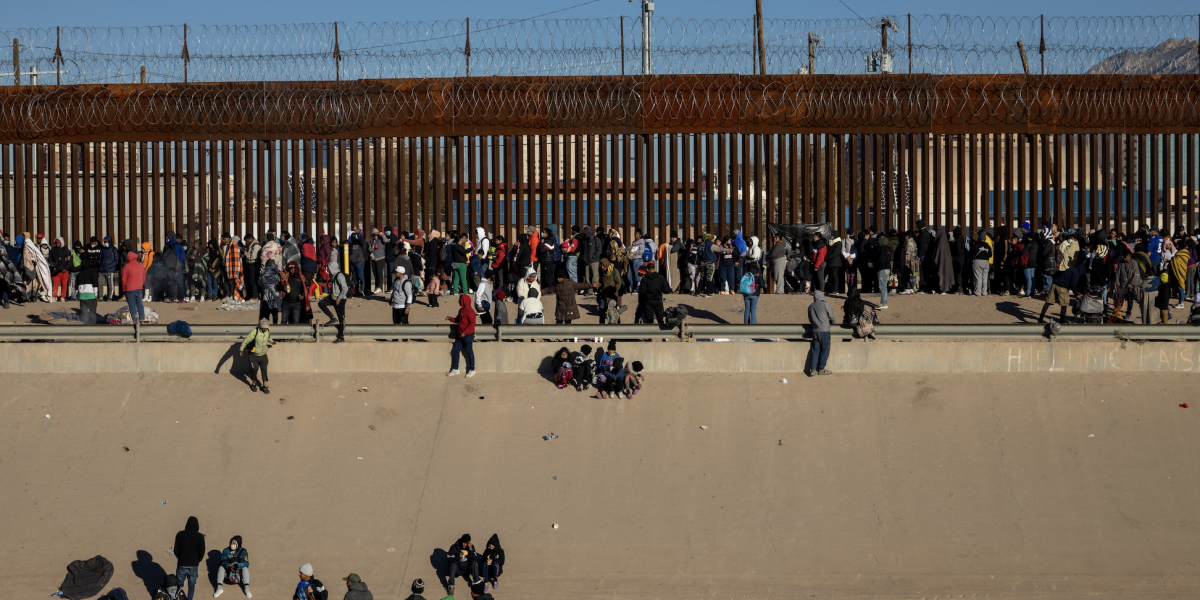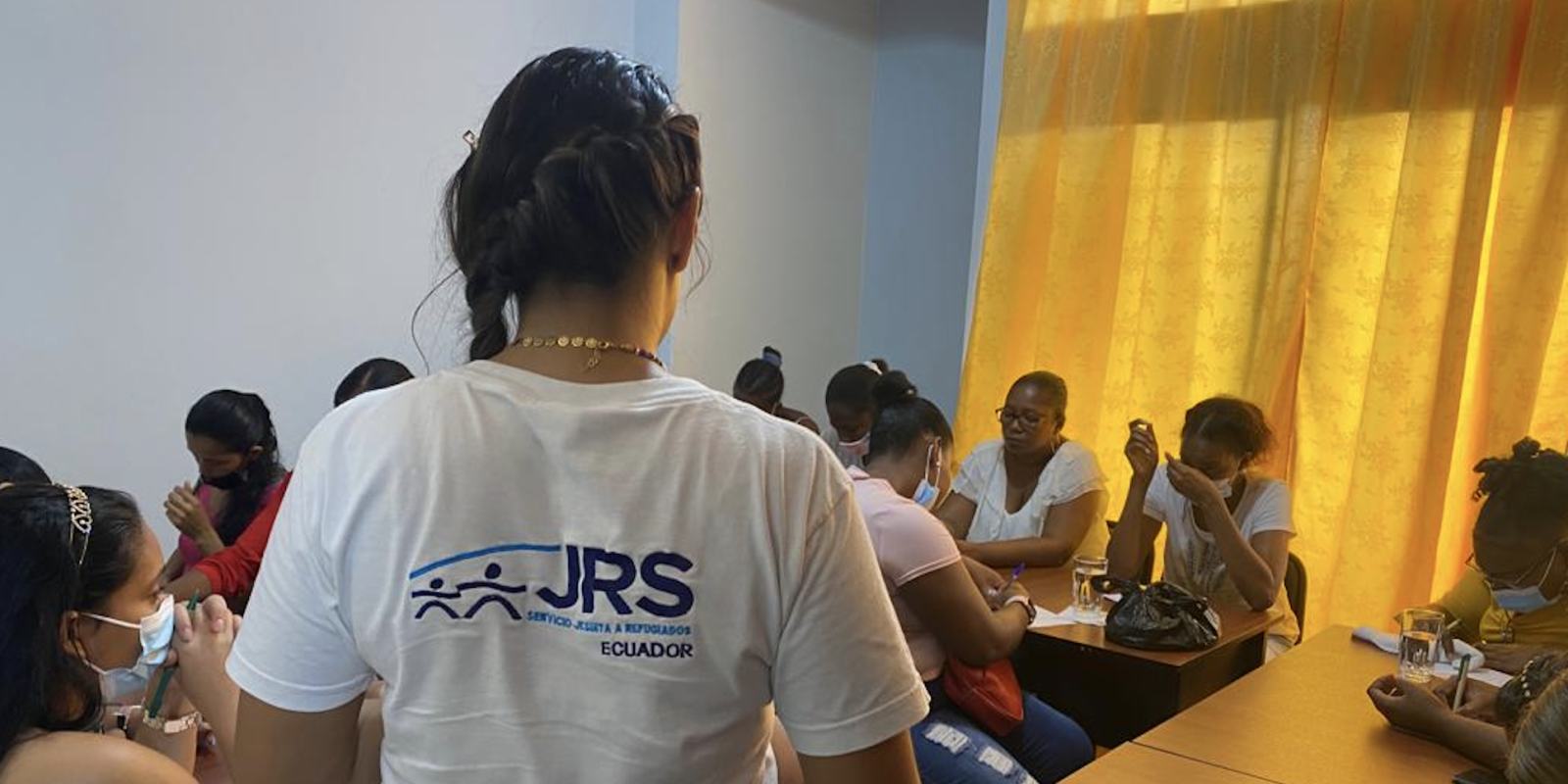Unimaginable Horrors at the U.S.-Mexico Border
02 October 2023|Chloe Gunther

Warning: mention of gender-based violence including sexual assault.
This past month, JRS/USA and JRS/Mexico co-published a report, “Accompaniment at the U.S.-Mexico Border: Conditions Report and Policy Recommendations.” Details within the report come from JRS staff as they have accompanied refugees, migrants, and asylum seekers in shelters throughout El Paso, Texas and Ciudad Juárez, Mexico.
For this month’s INSIDER, we highlight three people who bravely shared their experiences trying to seek safety in the United States.
Meet Carlos*, Sonia*, and Ana*.
JRS/USA met Carlos at a migrant shelter in El Paso, Texas. He, his two young children, his wife, and grandmother-in-law were waiting to apply for asylum. They fled Venezuela for fear of political persecution.
Despite the threat to their lives in Venezuela, making the decision to journey to the U.S.-Mexico Border was incredibly difficult since Carlos’ wife was seven months pregnant. Over 3,000 miles (about the width of the United States), this dangerous route includes the Darien Gap and traversing through Central America.
Still, the family knew they had to leave and two days after they made it to the shelter in El Paso, his wife went into labor.
Their new child, a baby boy, suffered from a respiratory infection just days after he was born, and had to stay in intensive care for a month. Carlos remained in the shelter with his grandmother-in-law and two other children while his wife stood by their baby’s side.
Throughout this excruciating month, JRS/USA accompanied Carlos and his family. Staff visited his wife and son in the hospital, bringing food. They also got Carlos a phone so that he could talk to his wife.
He credits several support systems, including JRS, for helping him through this difficult time. “Thank you for the mission and the work you do,” he said.
Today, Carlos helps manage operations at a shelter in El Paso. He often works at night, supervising, and helping prepare meals. He is still in the process of applying for asylum.
_________________________________________________
Sonia and her daughter fled Honduras when an armed criminal group targeted the two of them. At first, they fled to another location in Honduras, hoping to find safety and be able to remain in their home country.
The group found them again and through the mother and daughter managed to survive, Sonia suffered a gunshot wound to her leg. She knew they had to leave.
When they arrive in Mexico, Sonia applied for refugee status for both her and her daughter, establishing domicile and working to find formal employment. But there in Mexico, Sonia was sexually assaulted by local security forces. She had to flee once more to protect herself and her daughter.
JRS/Mexico met Sonia in a shelter in Ciudad Juárez. They accompanied her and her daughter with mental health and psychosocial support (MHPSS). With legal support, she also filed a formal complaint against her aggressors.
Sonia does not feel safe anywhere. The life-altering and potentially traumatizing experiences she went through have taken a toll on her mental health and sense of security, JRS/Mexico explained. She is now seeking safety in the United States.
_________________________________________________
Ana was pregnant with her fifth child when she fled Honduras as violence threatened her family’s lives. She left the country with her brother and three of her children. Her eldest stayed behind.
As they neared Ciudad Juárez, ana and her children were kidnapped in Northern Mexico.
In the report, JRS staff detail and increased number of reported kidnappings by the people they accompany in migrant shelters and detention centers.
“Hundreds of individuals have shared their experiences of being arbitrarily captured, detained against their will, and deprived of liberty for extended periods of time until ransom in paid…armed criminal groups make a profit by targeting migrants and asylum seekers,” the report says.
The kidnappers demanded 15,000 pesos for the family to be let go but they did not have the money. She and her family were held for weeks, and Ana grew more anxious as she neared the end of her pregnancy.
She went into labor while they were being held, and the kidnappers took her to the hospital. Still, they kept Ana and her baby hostage until the money could be raised.
After they were released, the family finally reached the U.S.-Mexico Border. They have been in a migrant shelter ever since as they wait for an appointment through the CBP One App.
However, the requirement to apply for an appointment through the app is restrictive in and of itself since it assumes migrants have easy access to a smartphone, the internet, and can speak one of the five languages the app offers translations for.
Ana and her children live in extreme fear and will not leave the migrant shelter. They are desperately waiting for asylum.
_________________________________________________
You can take action today and call on your Representatives to increase access to asylum so that families like Carlos’, Sonia’s and Ana’s can safely rebuild their lives.



